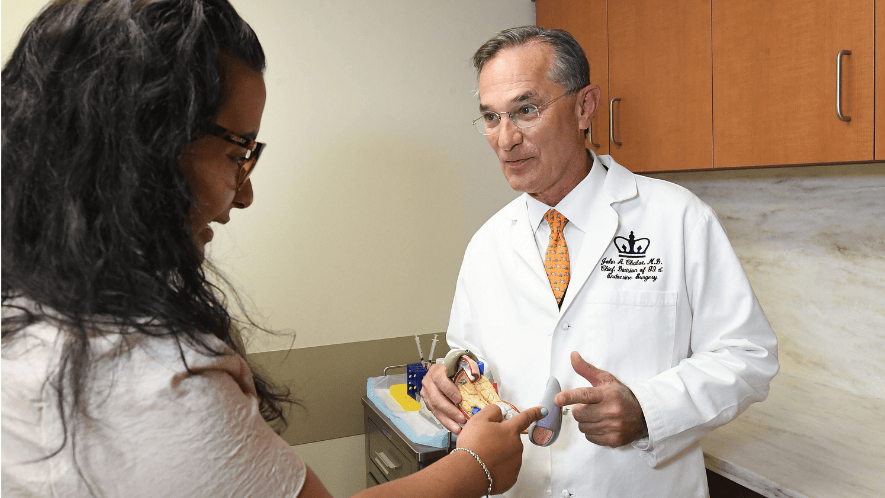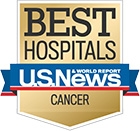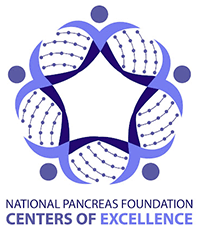Pancreatic Cancer Care Program
On Page Nav:

A diagnosis of pancreatic cancer can be stressful, scary, and confusing. Here at the Pancreas Center, we strive to decrease the burden by giving highly coordinated, compassionate, and dedicated patient care. As a patient at the Center’s Pancreatic Cancer Care program, you will have access to an experienced team of clinicians, oncologists, surgeons, radiologists, genetic counselors, psychiatrists, and nutritionists. Working together with you, your family, and any outside physicians you may have, we will create the best possible treatment plan to meet your personalized goals of care. Our approach to pancreatic cancer has earned Columbia a National Pancreas Foundation Center of Excellence designation and distinction from US World & News report.



Call (212) 305-9467 or use our online form to get in touch today.
Our Goals
- Significantly increase the cure rate of individuals with pancreatic cancer
- Maintain the best possible quality of life for individuals with pancreatic cancer
- Provide genetic testing and counseling for all at-risk individuals
- Improve our understanding of the disease and its treatments via clinical, translational, and basic research
- Be a magnet site for the medical community to test new concepts in pancreatic cancer care
- Eliminate the fatalism that is commonly expressed about pancreatic cancer
Our commitment to fulfilling these goals is backed by our legacy of quality and leadership in the field. Columbia ushered in the modern era of pancreatic cancer decades ago, when Dr. Allen Whipple performed the very first pancreaticoduodenectomy procedure, and our Pancreas Center was one of the first dedicated, multispecialty centers of its kind in the world.
Today, we treat people from all over the world, giving them the support of a highly-specialized team that values communication and collaboration as much as clinical excellence. As part of one of the country’s top hospitals and an ivy-league academic institution, our center treats more people with pancreatic cancer each year than any other program in the region, which makes our team the most experienced around, and we’re leading the way in prevention and screening.
While we’re proud of our history and our present accomplishments, our eyes are always on the future. That’s why we’ve made a deep investment in research, so we can bring you newer and better treatment options, like targeted therapeutics addressing specific molecular pathways. We won’t be satisfied until pancreatic cancer is a curable disease.
Learn how the Pancreas Center's Hope Ahead campaign is charting the future of pancreatic care »
Let us help you by requesting an appointment at (212) 305-9467, or using our online form.
Stories & Perspectives
Stories of Hope: Jeff W.
Jeff W. was a healthy and vibrant 58-year-old movie producer, husband, and father of two when he began experiencing stomach pains while in Eastern Europe for work. He visited a local clinic, where nothing was found on an ultrasound. Upon arriving back in the United States, he got a CT scan that revealed a mass on his pancreas.
Stories of Hope: Sylvia George
Sylvia George was first diagnosed with advanced localized pancreatic cancer in May of 2017. It started with unexplained back pain, a vague symptom that led Sylvia to make an appointment with her GP. After a CT scan found a spot on her pancreas, the biopsy then confirmed the diagnosis.
What We Offer
- Coordinated medical and surgical care
- Genetics screening
- Cyst Surveillance
- Radiation Therapy
- Support groups
- Clinical Trials
About Pancreatic Cancer
Pancreatic cancer is one of the most challenging diseases physicians face today because it responds poorly to treatment and it quickly spreads to surrounding organs.
- Risk factors: The main risk factor for pancreatic cancer is cigarette smoking, which also appears to accelerate tumor growth. A family history of pancreatic cancer and hereditary cancer syndromes also greatly increase risk, contributing to about 10% of cases. Most people diagnosed with the disease are between the ages of 60 and 80, although those with an inherited predisposition are usually diagnosed much earlier.
- Symptoms: Gastrointestinal symptoms such as abdominal pain, bloating, nausea, and changes in the stool are the most common. Other symptoms include jaundice and rapid weight loss. Some people experience dull back pain. In rare cases, unexplained early-onset diabetes (diagnosed before age 50) can be another important symptom.
- Diagnosis: Early detection of pancreatic cancer can profoundly impact one’s chances of survival. A combination of lab tests, imaging tests like CT scans and MRIs, and biopsies may be used to make the diagnosis.
- Treatment: Surgery followed by chemotherapy is the standard treatment for pancreatic cancer. About one third of patients are inoperable because of blood vessel involvement. At the Pancreas Center, neoadjuvant chemotherapy and radiation has become a routine approach to inoperable patients, thereby increasing the opportunity for cure.
Read more educational information about pancreatic cancer »
Stories & Perspectives
Life can be snatched from you in an instant. A more diabolical way is to be told by your doctor that you have cancer. Is it just as much a life-crushing moment if you had an idea something was wrong and your doctor’s confirmation somehow gave it bonafide legitimacy? Read more here »
Our Team
Our Pancreatic Cancer program uses a multidisciplinary approach that brings together gastroenterologists, oncologists, surgeons, and many other specialists in order to provide you with the most comprehensive care possible. When you make an appointment with one Pancreas Center specialist, you are making an appointment with all of us.
Request an appointment with our team at (212) 305-9467, or use our online form.

John Chabot, MD | Pancreas Surgery

Beth Schrope, MD, PhD | Pancreas Surgery

John Poneros, MD | Gastroenterology

Susan E. Bates, MD | Medical Oncology

Tito A. Fojo, MD, PhD | Medical Oncology

Gulam A. Manji, MD, PhD | Medical Oncology

Kavel Visrodia, MD | Medical Oncology
See the full Pancreas Center team »
Stories & Perspectives
How the worst day of his life led to one patient's rebirth. Read more here »
Contact Us
Columbia Pancreas Center
(212) 305-9467 | Online appointment form
Herbert Irving Pavilion, 8th Floor
161 Fort Washington Avenue
New York, NY 10032
Maps & Directions »
Fax: (212) 305-1571
Hudson Valley Office
1985 Crompond Road
Cortlandt Manor, NY 10567
Maps & Directions »
Stories & Perspectives
Adam was a clinical psychologist, well versed in behavioral techniques for addressing anxiety. But he was completely unprepared when he received a diagnosis of pancreatic cancer. “All of my training and knowledge seemed to vanish in an instant and I felt myself falling through space. I was terrified.” Read more here »
More Resources
- What To Expect from an appointment at the Pancreas Center
- New Patient Form
- Pancreas Cancer Support Group
- Pancreatic Cancer Prevention & Genetics Program
- Read all of our patient stories
Stories & Perspectives
Vaccine for Pancreatic Cancer Enters Phase II of Clinical Trial: Here’s What to Know
A groundbreaking Phase II clinical trial for a mRNA neoantigen vaccine for pancreatic cancer is underway. With a mortality rate of nearly 90 percent, this could be a transformative development in the treatment of pancreatic cancer. Dr. John Chabot shares what you need to know.
Using AI for Early Detection of Pancreatic Cancer? Five Questions with Dr. John Chabot
Study of AI’s ability to diagnose pancreatic cancer: John A. Chabot, MD, Executive Director of The Pancreas Center speaks about this study and where we go now.
